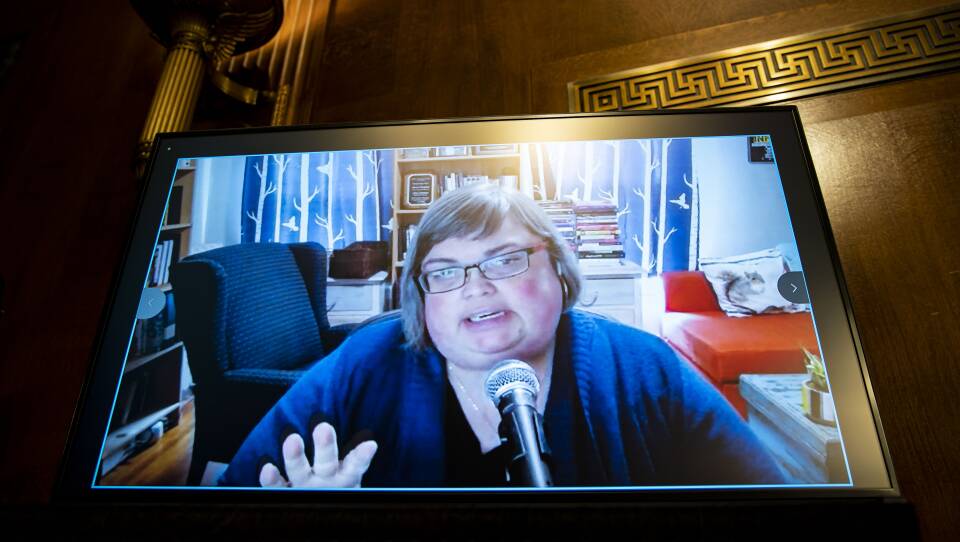A former Harvard staff member and disinformation expert filed a complaint on Monday against the university, alleging unfair treatment and an unfair firing.
Joan Donovan claims in her complaint, filed with the Massachusetts attorney general and the U.S. Department of Education, that her main project was gutted after Harvard received a record $500 million donation from the Chan Zuckerberg Initiative in late 2021, a foundation run by Meta’s Mark Zuckerberg and his wife.
Donovan, who now works for Boston University, was leading Harvard’s Technology and Social Change Research Project and primarily focused on misinformation on social media.
“I was duped, in many ways, into believing that I would be protected because I was at Harvard,” Donovan told GBH News. “I never imagined I would need protection from Harvard to do my research.”
Donovan says, at Harvard, she had been working on a project that would make the Facebook Papers public domain.
The trove of internal company documents were disclosed to the U.S. Securities and Exchange Commission in 2021 by a former Facebook employee. They reportedly show that the social media platform internally kept track of real-world problems that it had itself created and propagated, and that the tech company had ignored warnings from its own employees about risks.
Donovan said she received the papers lawfully and that she felt she had a duty to publicize them.
“Facebook has set up a series of research engagements where Facebook, by contract, has the right to kill these projects before they get published,” she said. “There is a serious problem in the field of internet studies where Facebook themselves are picking the research agenda about them — and they're also picking who gets to do research and who gets access.”
According to the complaint, Donovan claims that leaders at the Kennedy School “were inappropriately influenced by Meta/Facebook.”
More Education
During a Zoom meeting with the school’s main donor in October 2021, Donovan discussed the leaked papers and how Meta knew it was causing harm.
Donovan said that in that meeting, former Facebook communications executive Elliot Schrage behaved erratically and, according to the complaint, told her that she didn’t understand the papers.
Almost two weeks later, Donovan said she slowly began losing her academic freedom as the dean kept adding restrictions to her research.
“I wasn't allowed to hire. I wasn't allowed to have a conference related to public interest issues in internet communications,” she said. “I was blocked from having a podcast — and the dean said that he was most notably not going to allow anything that increased my public profile.”
Donovan said she was fired earlier this year even though her contract was supposed to go through the end of 2024.
In an email to GBH News, Sofiya Cabalquinto, a spokesperson for the Harvard Kennedy School, said that Donovan was never fired and that the complaint’s allegations of unfair treatment and donor interference are false.
Cabalquinto added that all research projects at Harvard Kennedy School need to be led by faculty members and that Donovan was hired as a staff member, not a faculty member.
“When the original faculty leader of the project left Harvard, the School tried for some time to identify another faculty member who had time and interest to lead the project,” Cabalquinto said. “After that effort did not succeed, the project was given more than a year to wind down.”
Cabalquinto said the Harvard Kennedy School also denied that it allowed Facebook to dictate its approach to research.
While at Harvard, Donovan said she fundraised and received millions in grants, including $1 million from Craigslist founder Craig Newmark.
In the complaint, she alleges that Harvard kept all of the money she raised.
She said she hopes that different entities and agencies dig into Harvard's relationship with donors and audit the funding she raised to see where that money has gone since she was terminated.
“The last thing I hope for is that I'm the first of many,” she said. “I'm hoping that other whistleblowers who have had to deal with tech companies soft and hard influencing their research in different ways come forward and we can, as a field, move together in a better direction.”
The Massachusetts attorney general’s office has received the complaint and is currently reviewing it.








